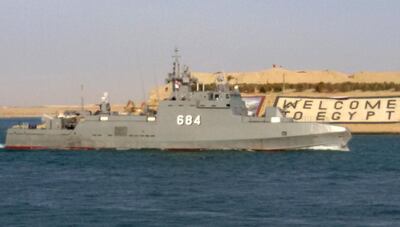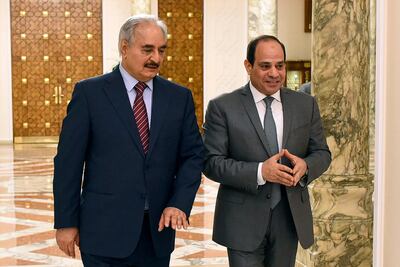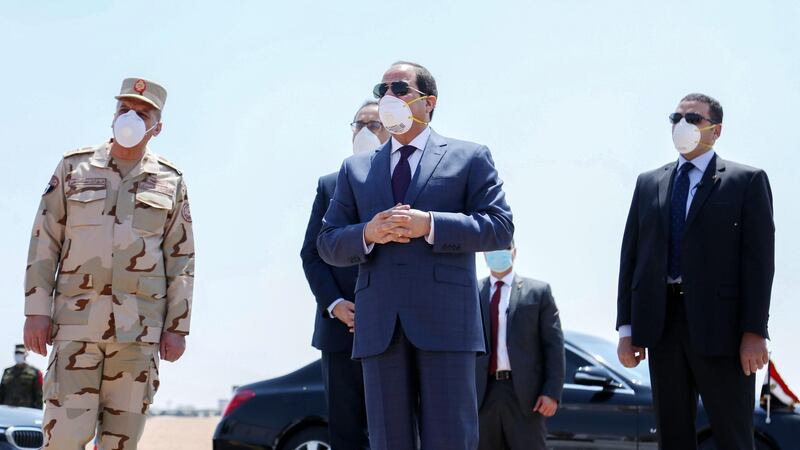Over the relatively short period of just five years, Egypt’s military has gone on an arms shopping spree that netted it cutting-edge weapon systems to add to its massive arsenal of US-made and ageing Soviet-era hardware. And with those multibillion-dollar procurements came what appears to be endless joint military exercises with nations from across the Middle East and Europe.
But, is Egypt readying to go to war?
If available evidence is anything to go by, then the answer is both “yes” and “no.”
Egypt’s high-octane drive to purchase cutting-edge weapons and the high frequency with which it conducts war games both singularly and with other militaries are a reflection of the multitude of security challenges that face the nation of 100 million people. General-turned-president Abdel Fattah El Sisi is also pressing ahead with ambitious modernising plans, including a construction frenzy and a radical programme to overhaul the economy, all while fighting a resilient insurgency by Islamist extremists in the northern part of the Sinai Peninsula.
Egypt’s reluctance to be drawn into war beyond its borders was evidenced when it passed on deploying troops in two conflicts many thought to be inevitable for the country to enter. The first is in Yemen, where a Saudi-led coalition has been fighting Iranian-backed Houthi rebels since 2015 to restore the internationally recognised government. The second is the civil war in neighbouring Libya, where Egypt supports Field Marshal Khalifa Hafter and his Libyan National Army against the Turkish-backed government based in the capital Tripoli and allied militias.
Instead of putting boots on the ground in Yemen, Egypt deployed warships in the Red Sea to protect shipping lanes going to and from the Suez Canal, a major source of income, and deter the Houthis from interfering with trade – having launched a number attacks on passing tankers in recent years.
To its west, it has staged large-scale military exercises near its border with Libya in a potent show of force that followed a series of battlefield setbacks suffered by its Libyan ally since a small Turkish military contingent arrived in Libya nearly a year ago.
“Those war games serve as a deterrence, provide an opportunity to test our new weapon systems as well as the inevitable educational value that comes with working alongside modern foreign militaries,” said Samir Farag, a retired Egyptian army general who is now a prominent military analyst. “But Egypt will only go to war if its own national security is directly breached.”
First elected to office in 2014, Mr El Sisi is known to have personally overseen the drive to procure arms that include – among other things – German submarines, French Rafael fighter-jets and blue-water troop carriers equipped with helicopter gunships as well as Russian-made assault helicopters. In the pipeline are state-of-the-art SU-35 warplanes from Russia and warships from Italy.

The new weapons have joined a vast arsenal of US-made weapons given to Egypt as part of a decades-long American aid programme launched as a reward for making peace with Israel in 1979. They include F-16 fighter-jets, Abrams tanks, Apache helicopter gunships and M113 armoured personnel carriers.
They are also added to Soviet-era weapons from the 1970s and 1960s that Egypt used to fight Israel in the last of their wars in 1973.
“The Egyptian army is indeed a strong army, one of the strongest in the region. But, it’s a prudent army, it defends, rather than threaten, it’s concerned with security, not aggression. This is our doctrine, our strategy and our steadfast constants,” President El Sisi recently told a group of servicemen. He, however, added: “Be prepared to carry out any mission, whether at home or, if necessary, beyond our borders.”
In a paper published last year, the Carnegie Middle East Center acknowledged that the 500,000-strong Egyptian military was undergoing “substantial capacity upgrades” under Mr El Sisi after a period of stagnation during the 29-year rule of Hosni Mubarak.
“ … El Sisi is pushing long-overdue overhauls of Egypt’s military doctrine, its weapons procurement and its interoperability with allied forces. Less clear is whether or not these changes are being accompanied by improvements in training, maintenance and overall readiness,” said the study.
Egypt’s military has not deployed in a singular capacity outside the country since its ill-fated expedition in Yemen in the 1960s, fighting on the side of the republicans against monarchist forces. The memory of that intervention is associated with Egypt’s stunning defeat at the hands of Israel in 1967, which was in a small part attributed to the deployment away from home of some of the country’s elite forces.

Egypt’s decision not to deploy troops as part of the Saudi-led coalition, say analysts, may have been influenced in large part by Cairo’s fears of a repeat of its intervention more than 50 years ago, when it lost more than 15,000 of its men in a conflict many say Egypt had no business entering.
"We have a strong military, but it's a conservative military that does not take foreign deployment lightly," Nabil Fahmy, Egypt's former foreign minister and former ambassador to the United States, told The National in an interview earlier this month.
Similarly, Egypt has cautiously handled the civil strife in Libya, the North African state with which it shares a 1,200-km desert border. While pushing for a political settlement to end divisions and bloodletting in its energy-rich neighbour, it declared last summer it would intervene militarily there if hostile forces crossed eastward an imaginary “red line” extending from the coastal city of Sirte down to the oasis town of Juffra. That threat, coupled with a pair of large-scale naval, air and ground war games close to the Libyan land border and Mediterranean coast appeared to have succeeded in keeping Egypt out of that conflict, at least for now.
In the East Mediterranean, where Egypt struck natural gas in significant quantities, Egypt has been projecting its new military might in a series of high-profile war games with allies and friends, hoping that that would be enough to deter archrival Turkey from continuing its bullying tactics to muscle in on a potentially lucrative, gas-based project in which Egypt is partnering with Ankara’s arch foes Cyprus and Greece.
Reflecting the strategic importance of the East Mediterranean region, Egypt has in recent years held countless war games there with Cyprus, Greece, Italy, France and Spain. In a deeply symbolic move, Egyptian warships this month sailed through Turkey’s narrow Bosphorus Strait into the Black Sea to join their Russian counterparts in naval war games.
Egypt’s rhetoric on Turkey’s illegal exploration for natural gas in the East Mediterranean, meanwhile, was notably hardened during a visit last week to Athens by Mr El Sisi. In comments that fell just short of declaring Cairo’s willingness to go to war to protect its natural gas, the Egyptian leader said his country and its allies would stand up to any action that poses a threat to the stability and security of the region.
“We will not tolerate any party trying to impose its hostile will on us … in order to protect our national security and exploit the available natural resources,” said Mr El Sisi, who did not mention Turkey by name.
“It’s a question of credibility. To show that you are serious. Buying modern weapons is part of the policy of deterrence because you never know when you’ll need them,” said Jehad Aouda, a US-trained professor of international relations at Cairo’s Helwan University. “The level of uncertainty in today’s world is extremely high. You cannot trust anything or anybody, including alliances. You must be in possession of what indicates to others that you are capable.”
To the south, Egypt and Sudan are currently holding rare joint war games. The exercises, taking place in Sudan, follow emerging signs of closer ties between Cairo and the military-led transitional government in Khartoum after a period fraught with tension. The war games, which followed a visit to Sudan by Egypt’s chief of staff, serve as a subtle message to Ethiopia, whose massive, nearly-complete dam on the Nile threatens to significantly reduce the Arab nation’s live-or-die share of the river’s waters.
For Sudan, like Egypt a downstream nation, sees a potent threat in Ethiopia’s refusal to commit to a legally binding deal to govern the operation of the dam and resolve future disputes.
Bound by historic but turbulent ties to Egypt, Sudan shares a border with Ethiopia but Mr El Sisi has said he wanted the dispute with the Horn of Africa nation to be settled through negotiations, which began a decade ago but are yet to produce any tangible results. He, however, never categorically ruled out military action.







